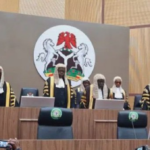It is a well-worn tradition for our colleagues in the Judiciary to use the occasion of their retirement to make fine speeches full of platitudes that hardly anyone notices thereafter. At his valedictory speech on retirement at 70, Justice Musa Dattijo Mohammed of the Supreme Court decided to take matters beyond the next level. He spoke from the heart, on Thursday last week, giving us a peep into the rot pervading in the Judiciary. The speech became an immediate sensation. Daily Trust called it a bombshell that set the internet on fire. Indeed, it did, as what he said furiously dominated discussions in the media throughout the weekend.
I took note of the speech for two reasons. Firstly, Justice Musa Dattijo is the last of my ABU 1976 set on the Supreme Court after the retirement of Justice Abdu Aboki last year. The ABU graduates from the Faculty of Law of that year would arguably be some of the most distinguished in the annals of the Nigerian Judiciary becoming predominant here and there. Only in the last few years had they begun to fade away one after the other. Ibrahim Bala Mairiga retired as Chief Judge of Kebbi State in 2017 followed closely by the exit of Ibrahim Auta, the Chief Judge of the Federal High Courts, and Abdu Aboki of the Supreme Court who retired last year.
Secondly, the speech reminds me of another, some 30 years ago, that caused the same stir among the Nigerian public. I refer to the speech made by Lt. General Salihu Ibrahim, Chief of Staff of the Nigerian Army when he was retiring in 1993. Maybe some readers might recall that 1993 was probably the nadir the military regimes reached in our history when a free presidential election was outrightly cancelled leading to widespread protests. General Salihu’s valedictory speech was full of regrets at what he saw as the falling standards, lack of professionalism, and all that in the Nigerian Army. His famous one-liner, ‘the Nigerian Army has become the army of anything’ is still widely quoted today to denote an extreme institutional failure.
In his valedictory speech, reminiscence of the famous General Salihu Ibrahim’s put down of the Nigerian Army under his command, Justice Musa Dattijo, did not spare the Nigerian Judiciary which in his view has fallen far from grace. He could easily have used the same one-liner to say, ‘The Nigerian Judiciary has become the judiciary of anything’. Justice Dattijo began his speech by wistfully recalling when he joined the Supreme Court things were tolerable, ‘The journey was calm and fulfilling until about halfway through my Supreme Court years when the punctuating turbulent cracks made it awry and askew.’ From thence onwards it was an avalanche of things that have gone amiss.
- How thugs, task forces are killing businesses at Suleja markets
- Hong Kong, France-bound bizmen arrested over cocaine, heroin
Starting from the overarching powers of the Chief Justice (CJ) which made other justices of the court, particularly Justice Dattijo who was the second in command, mere onlookers in the administration of justice. The consequence of the CJ’s enormous powers became an opportunity for abuse. Justice Dattijo said, ‘This needs to change. Continued denial of the existence of this threatening anomaly weakens effective judicial oversight in the country’. He made many other scathing remarks on the poor funding of the Judiciary, deficient salaries of the judges, the corruption in the process of appointing judges, and the quality of judgements of the bench which has become unpredictable due to unnecessary interference.
At a time, in 2022, aggrieved judges of the Supreme Court, including the incumbent CJ had to petition against the shabby treatment meted to them by the head of the court and the Chief Registrar, which ostensibly led to the resignation of Chief Justice Ibrahim Tanko Muhammad.
It was a legion of complaints from the retiring judge. But what galls from what Justice Dattijo said is the refusal to fill up the seats vacated by the death or retirement of judges that eventually left some zones of the country without anyone within the confines of the Supreme Court. This might not have impeded the workings of the court nor the quality of its judgement. However, in times of political contestations such as we had this year and matters reaching the Supreme Court for adjudication, these lapses could be willing tools in the hands of conspiracy theorists whenever some judgement of the Supreme Court did not favour them.
In the long run, Justice Musa Dattijo laments leaving the Supreme Court dissatisfied. He moans, ‘My lords, distinguished invitees, ladies and gentlemen, it is obvious that the judiciary I am exiting from is far from the one l voluntarily joined and desired to serve and be identified with. The institution has become something else’. There is yet a ray of hope as Justice Dattijo alludes that the situation can be turned around if we all put our heads to it. He said, ‘The duty to revive the institution remains a collective one. We must persist.’
Justice Dattijo’s valedictory speech is a sad commentary on the Nigerian judiciary. It is even sadder that as it is constituted it cannot help itself. President Bola Tinubu and the leadership of the National Assembly must step in to help. Short-term measures could include the immediate filling of the vacated seats in the court and increased funding for the running and upkeep of the court.

 Join Daily Trust WhatsApp Community For Quick Access To News and Happenings Around You.
Join Daily Trust WhatsApp Community For Quick Access To News and Happenings Around You.

